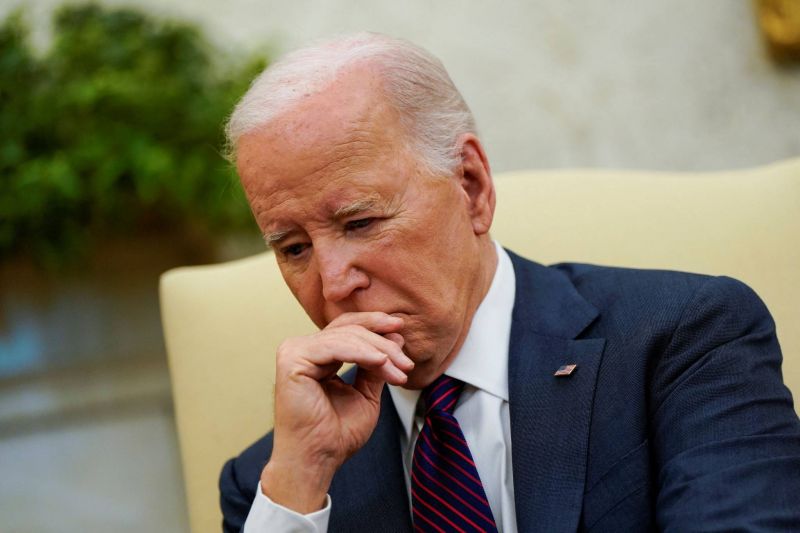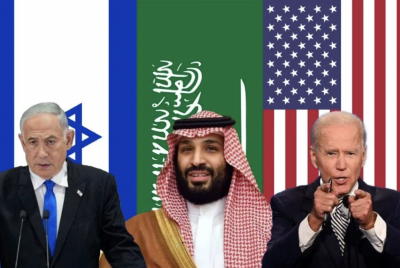
US President Joe Biden in the White House, on Apr. 15, 2024. (Credit: Elizabeth Frantz/Reuters)
US President Joe Biden's administration is pushing for a "long-shot diplomatic deal" in the coming months pressuring Israeli Prime Minister Benjamin Netanyahu to accept a new commitment to Palestinian statehood in exchange for diplomatic recognition from Saudi Arabia, according to US and Saudi officials who spoke to American newspaper the Wall Street Journal (WSJ).
According to a WSJ report published on Thursday, the White House is offering Riyadh a "more formal defense relationship with Washington, assistance in acquiring civil nuclear power, and a renewed push for a Palestinian state," in return for the Gulf country's diplomatic engagement with Israel. US officials say that they are in the final stages of negotiating this package, which would provide a "historic normalization deal with Riyadh," WSJ reported.
In the year leading up to the outbreak of the war on Gaza, the White House was involved in trying to establish a diplomatic relationship between the two countries, but the process was indefinitely paused on Oct. 7.
Last Saturday, Iran launched more than 300 drones and missiles at Israel in retaliation to the latter's attack on the Iranian consulate annex in Damascus. During Iran's attack, Jordan’s air force intercepted and downed Iranian drones heading toward Israel. Saudi Arabia and the United Arab Emirates (UAE) also played a pivotal role in neutralizing the attack, though the full extent of their involvement is unclear.
US officials say the "successful multi-country effort to shoot down Iranian missiles and drones on Saturday should make it clear to Israel that its security against threats from Tehran can be enhanced through closer integration with Saudi Arabia."
For Biden, such a deal offers the chance of a "significant breakthrough" in the lead up to the US presidential elections set to take place in November.
Biggest challenge: Convincing Netanyahu and his government
However, convincing Netanyahu to take part in discussions about the establishment of a Palestinian state "remains a difficult hurdle," US and Israeli officials told WSJ.
Since Hamas' attack on Israel on Oct. 7, opposition to Palestinian statehood has increased among right-wing members of Netanyahu's government and much of the Israeli public. A recent public opinion poll in January showed that 59 percent of Jewish Israelis oppose an agreement that would lead to a Palestinian state, even if it led to peace agreements with Arab states.
For decades, Saudi top diplomats have made it clear that creating a path to a two-state solution is part of their price for normalization with Israel. Now, Saudi officials have privately indicated to the US that they might "accept verbal assurances from Israel that it would engage in new talks on Palestinian statehood to secure the other parts of the deal of more interest to Riyadh," Saudi officials said.
Saudi officials also said that this deal might also "aid Israel with a potential exit strategy from Gaza once that conflict is brought to an end." According to WSJ, the US has "sketched out a postwar plan that would draw on troops from Arab states to secure Gaza."
However, several potential Arab contributors say they wouldn’t consider participating without Israel first taking steps, publically, toward the establishment of a Palestinian state.
US Secretary of State Antony Blinken visited Saudi Arabia in March and said, after a meeting with the Saudi Crown Prince Mohammed bin Salman in Jeddah, that the USA and Saudi Arabia have made "good progress" in their discussions regarding the relationship between the kingdom and Israel.
A temporary cease-fire in Gaza "would make it easier for the Saudis to conclude their portion of the US-brokered draft agreement," Arab officials told WSJ. But, negotiations between Hamas and Israel have, at best, crawled forward in the last couple of months and are currently stalled, according to Qatari statements.
